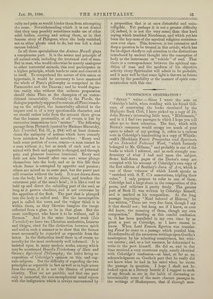< Ancient Opinions Upon Psychic Bodies (continued from page 10-252) >
culty and pain as would hinder them from attempting the same. Notwithstanding which it is not denied that they may possibly sometimes make use of other solid bodies, moving and acting them, as in that famous story of Phlegons, when the body vanished, not as other ghosts used to do, but was left a dead carcase behind.”
In all these speculations the Anima Mundi plays a conspicuous part. It is the source and principle of all animal souls, including the irrational soul of man. But in man, who would otherwise be merely analogous to other terrestrial animals, this soul participates in a higher principle, which tends to raise and convert it to itself. To comprehend the nature of this union or hypostasis, it would be necessary to have mastered the whole of Plato’s philosophy as comprised in the Parmenides and the Timæus; and he would dogmatise rashly who without this arduous preparation should claim Plato as the champion of an unconditional immortality. Certainly in' the Phædo, the dialogue popularly supposed to contain all Plato’s teaching on the subject, the immortality allotted to the impure soul is of a very questionable character, and we should rather infer from the account there given that the human personality, at all events, is lost by successive immersions into “matter.” The following passage from Plutarch (quoted by Madame Blavatsky, Isis Unveiled, Vol. II., p. 284) will at least demonstrate the antiquity of notions which have recently been mistaken for fanciful novelties: “Every soul hath some portion of nous, reason—a man cannot be a man without it; but as much of each soul as is mixed with flesh and appetite is changed, and through pain and pleasure becomes irrational. Every soul doth not mix herself after one sort: some plunge themselves into the body, and so in this life their whole frame is corrupted by appetite and passion; others are mixed as to some part, but the purer part still remains without the body. It is not drawn down into the body, but it swims above, and touches the extremest part of the man’s head; it is like a cord to hold up and direct the subsiding part of the soul, as long as it proves obedient, and is not overcome by the appetites of the flesh. The part that is plunged into the body is called soul. But the incorruptible part is called the nous, and the vulgar think it is within them, as they likewise imagine the image reflected from a glass to be in that glass. But the more intelligent, who know it to be without, call it Daemon.” And in the same learned work (Isis Unveiled) vie have two Christian authorities, Irenaeus and Origen, cited for like distinction between spirit and soul in such a manner as to show that the former must necessarily be regarded as separable from the latter. In the distinction itself there is, of course, no novelty for the most moderately well informed. It is insisted upon in many modern works, among which maybe mentioned Heard’s Trichotomy of Man and Green’s Spiritual Philosophy; the latter being an exposition of Coleridge’s opinion on this and cognate subjects. But the difficulty of regarding the two principles as separable in fact as well as in logic arises from the sense, if it is not the illusion of personal identity. That we are partible, and that one part only is immortal, the non-metaphysical mind rejects with the indignation which is always encountered by a proposition that is at once distasteful and unintelligible. Yet perhaps it is not a greater difficulty (if, indeed, it is not the very same) than that hard saying which troubled Nicodemus, and which yet has been the key-note of the mystical religious consciousness ever since. This, however, is too extensive and deep a question to be treated in this article, which has for its object chiefly to call attention to the distinctions introduced by ancient thought into the conception of body as the instrument or “vehicle” of soul. That there is a correspondence between the spiritual condition of man and the medium of his objective activity every Spiritualist will admit to be probable, and it may well be that some light is thrown on future states by the possibility or the manner of spirit communication with this one.
Unconscious Cerebration?
...
<... continues on page 10-254 >
Editor's notes
- ↑ Unconscious Cerebration? by unknown author, London Spiritualist, No. 388, January 30, 1880, pp. 53-4
Sources
-
London Spiritualist, No. 388, January 30, 1880, pp. 53-4

